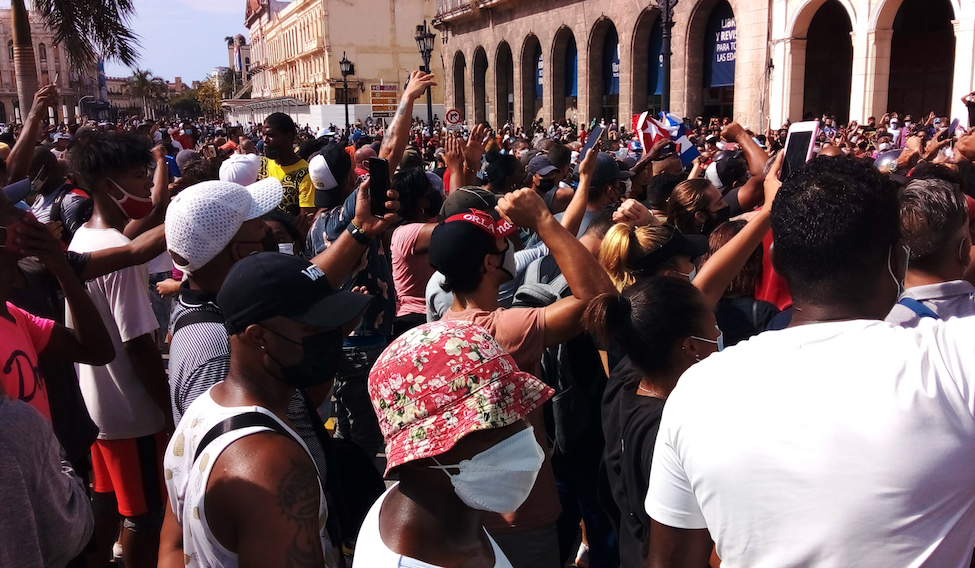The recent protests in numerous Cuban cities mark a turning point in the country's history. Ordinary Cuban citizens took to the streets demanding their freedom, and numerous demonstrations around the world have echoed the popular uprising. Events in Cuba, which are ongoing, have revived hopes that freedom, as Willy Chirino sang three decades ago, "is coming." The slogans "Patria y Vida" (Homeland and Life") and #SOSCuba represent a paradigmatic change in the fight for Cuba's freedom, which feels closer than at any other time during the 62 years of the Castro-communist dictatorship.
Naturally, all should focus on supporting the protests and denouncing the regime's crackdown on the protesters. However, the current discussion of the events in Cuba lacks an analysis of what may (or should) come after the dictatorship's possible fall. Although this topic is weighty and warrants further study, some key points should be discussed at this time.
Considerations regarding the possible leadership of a democratic Cuba are of great importance. Although many point to the "lack of leadership" among the Cuban dissenters and the opposition, comments in this regard generally refer to the lack of a main leader, in this way reflecting Cuban political culture. The strong tradition of caudillismo in Cuba, as in the rest of Latin America, makes the consolidation of power in the hands of one leader the norm in politics. This phenomenon also tends to extend to the non-governmental sector, and it will be difficult to dismantle the tradition of a very strong Executive, in the presidency, that dates back to the Republic.
Another challenge for Cubans in their fight for the future will be to prevent the spread of political parties that center entirely on their leaders. It is dangerous to go from one extreme to the other. The proliferation of too many political parties without clear platforms and dominated by their leaders, after six decades of a one-party system, could also undermine the democratic system. The political fragmentation that these party proliferations often spawn destabilize political systems.
Although it may seem unlikely to many, nostalgia for "Castrocommunism," or for certain aspects of it, may resurface in the future. This nostalgia for a dictatorial status quo arises when the situation under a democratic system becomes difficult due to political, economic or social factors. We see this kind of nostalgia for dictatorship today in Russia, 30 years after the fall of the Soviet Union, allowing President Vladimir Putin to revive certain aspects of the former Communist power, such as censorship, and his perpetuation in power. This nostalgia has appeared among Cuban exiles with the sale of "Russian meat" at some Miami supermarkets.
Taking into account some of the possible perils that a post-dictatorial Cuba may face, there are steps that the Cuba of the future must take to get off to a successful start. Essential among these is the creation of democratic institutions with solid foundations, as these institutions not only include the powers of the State (Executive, Legislative and Judicial), but also extend to political parties. For them to be develop and be strengthened, they need to have well defined political platforms that guide their members.
Civil society institutions, fully independent from the government, must also flourish throughout the country. These associations, often comprised of volunteers, will play a key role in offering services to local, provincial, and national communities on the island when the government is unable to do so. Helping to implement this factor is the proliferation of non-governmental organizations (NGOs) and non-profit ones among the community of Cuban exiles; the Lions, Rotary, Kiwanis, and PEN clubs, the National Associations of Lawyers and Journalists, and countless organizations can join those that exist in Cuba (considered illicit by the dictatorship) to forge this vibrant civil society.
One of the most important roles of this new civil society will be to promote political, economic and civic education. In this area there are already institutions (inside and outside of Cuba) dedicated to studying in depth the serious problems plaguing the Cuban people, and their work in this regard will be of great use in a future that is rapidly approaching.
Nobody knows when and how the Cuban dictatorship will come to an end, but history shows us that there are no permanent dictatorships. We are witnessing historic and unprecedented developments in the recent history of Cuba, and we must all do our part to achieve freedom for Cuba, at last. At the same time, we need to think ahead and present and debate viable, concrete options for the free and democratic Cuba of the future. As we have seen for the past 62 years, the lives of an entire population depend on it.
